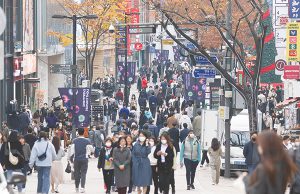Bloomberg
The strains in South Korea’s credit market showed further signs of easing, with short-term borrowing costs falling for the first time in 20 months on Monday.
Yields on three-month commercial paper — which companies use to raise funds for short-term payments like payroll — dropped a basis point in Seoul, which means conditions are improving. That would be the first decline since April 2021 after trading little changed last week, Bloomberg-compiled data show.
The drop underscores the easing of financial conditions underway after Korean officials in October rushed to ring-fence a full-blown crisis in what was considered one of Asia’s safer debt markets. The trouble began when the developer of an amusement park defaulted on a type of asset-backed security called PF-ABCP.
“The credit market has generally turned strong since early this month, and even in the CP market, which had shown relatively slow to recover, demand has recently been growing, mainly from high-quality issuers,†said SK Securities analyst Yun Won-tae.
“Still, difficulties in PF-ABCP may continue for a while.â€
Korea’s credit crunch highlights the tough balancing act officials around the world face as they seek to maintain both price and financial stability. Singapore’s central bank late last month warned of “potential dysfunction†in global funding markets and liquidity strains on financial firms that could spill over to banks and companies.
The near-meltdown of Korea’s debt market started after the developer of the Legoland Korea theme park in Gangwon province defaulted on its debt in late September.
Yields on commercial paper then surged to their highest since 2009, as the missed payment spooked investors. Officials responded with a liquidity support package of at least 50 trillion won ($38 billion), by relaxing the collateral rules for transactions with the central bank, and with guarantees for real estate projects, among various measures.
In a sign of those steps bearing fruit, the spread on 3-year AA- corporate notes has begun narrowing.
 The Gulf Time Newspaper One of the finest business newspapers in the UAE brought to you by our professional writers and editors.
The Gulf Time Newspaper One of the finest business newspapers in the UAE brought to you by our professional writers and editors.
